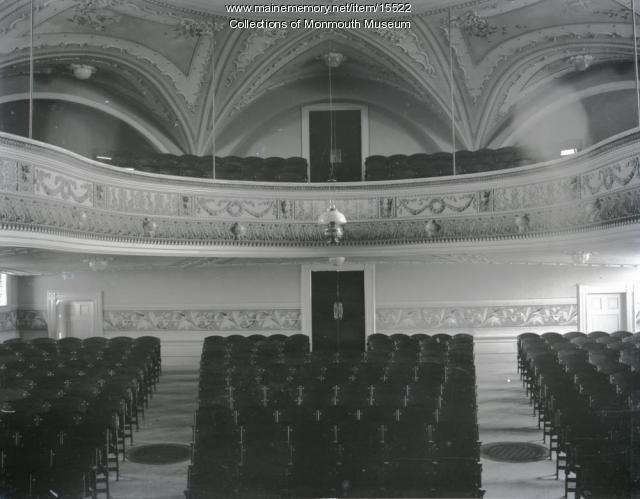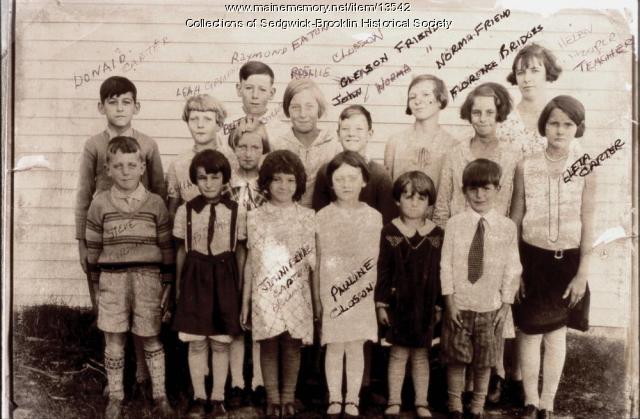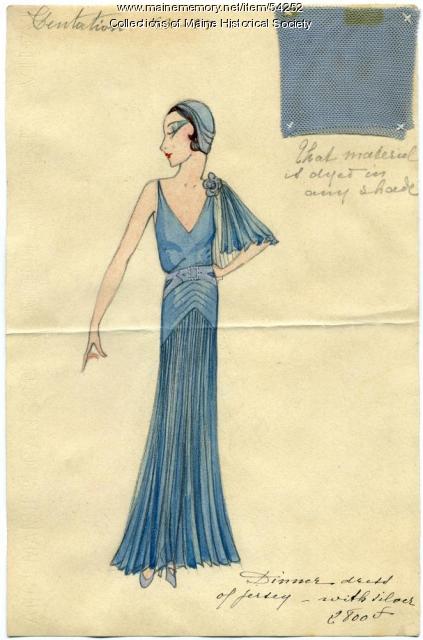Keywords: Aging
- Historical Items (591)
- Tax Records (10)
- Architecture & Landscape (8)
- Online Exhibits (129)
- Site Pages (183)
- My Maine Stories (59)
- Lesson Plans (3)
Online Exhibits
Your results include these online exhibits. You also can view all of the site's exhibits, view a timeline of selected events in Maine History, and learn how to create your own exhibit. See featured exhibits or create your own exhibit
Exhibit
A Celebration of Skilled Artisans
The Maine Charitable Mechanic Association, an organization formed to promote and support skilled craftsmen, celebrated civic pride and members' trades with a parade through Portland on Oct. 8, 1841 at which they displayed 17 painted linen banners with graphic and textual representations of the artisans' skills.
Exhibit
Music in Maine - Opera, Orchestras and Stages
"… and working people alike during the Golden Age of Opera, from the mid-to late 1800s. At 18, Nordica graduated from the New England Conservatory and…"
Exhibit
War Through the Eyes of a Young Sailor
Eager to deal with the "Sesech" [Secessionists], young deepwater sailor John Monroe Dillingham of Freeport enlisted in the U.S. Navy as soon as he returned from a long voyage in 1862. His letters and those of his family offer first-hand insight into how one individual viewed the war.
Exhibit
Maine Streets: The Postcard View
Photographers from the Eastern Illustrating and Publishing Co. of Belfast traveled throughout the state, especially in small communities, taking images for postcards. Many of these images, taken in the first three decades of the twentieth century, capture Main Streets on the brink of modernity.
Exhibit
Art of the People: Folk Art in Maine
For many different reasons people saved and carefully preserved the objects in this exhibit. Eventually, along with the memories they hold, the objects were passed to the Maine Historical Society. Object and memory, serve as a powerful way to explore history and to connect to the lives of people in the past.
Exhibit
Passing the Time: Artwork by World War II German POWs
In 1944, the US Government established Camp Houlton, a prisoner of war (POW) internment camp for captured German soldiers during World War II. Many of the prisoners worked on local farms planting and harvesting potatoes. Some created artwork and handicrafts they sold or gave to camp guards. Camp Houlton processed and held about 3500 prisoners and operated until May 1946.
Exhibit
Shepard Cary: Lumberman, Legislator, Leader and Legend
Shepard Cary (1805-1866) was one of the leading -- and wealthiest -- residents of early Aroostook County. He was a lumberman, merchant, mill operator, and legislator.
Exhibit
Desserts have always been a special treat. For centuries, Mainers have enjoyed something sweet as a nice conclusion to a meal or celebrate a special occasion. But many things have changed over the years: how cooks learn to make desserts, what foods and tools were available, what was important to people.
Exhibit
Reading, Writing and 'Rithmetic: Brooklin Schools
When Brooklin, located on the Blue Hill Peninsula, was incorporated in 1849, there were ten school districts and nine one-room school houses. As the years went by, population changes affected the location and number of schools in the area. State requirements began to determine ways that student's education would be handled. Regardless, education of the Brooklin students always remained a high priority for the town.
Exhibit
Published women authors with ties to Maine are too numerous to count. They have made their marks in all types of literature.
Exhibit
Jameson & Wotton Wharf, Friendship
Since 1897, the Jameson & Wotton Wharf in Friendship has been an important addition to the community on Muscongus Bay. The wharf, which is accessible at all tides, was a steamboat stop for many years, as well as important to the lobster business.
Exhibit
George W. Hinckley and Needy Boys and Girls
George W. Hinckley wanted to help needy boys. The farm, school and home he ran for nearly sixty nears near Fairfield stressed home, religion, education, discipline, industry, and recreation.
Exhibit
Putting Men to Work, Saving Trees
While many Mainers were averse to accepting federal relief money during the Great Depression of the 1930s, young men eagerly joined the Civilian Conservation Corps, one of President Franklin Roosevelt's most popular programs. The Maine Forest Service supervised the work of many of the camps.
Exhibit
Memorializing Civil War Veterans: Portland & Westbrook
Three cemeteries -- all of which were in Westbrook during the Civil War -- contain headstones of Civil War soldiers. The inscriptions and embellishments on the stones offer insight into sentiments of the eras when the soldiers died.
Exhibit
The Life and Legacy of the George Tate Family
Captain George Tate, mast agent for the King of England from 1751 to the Revolutionary War, and his descendants helped shape the development of Portland (first known as Falmouth) through activities such as commerce, shipping, and real estate.
Exhibit
Graduations -- and schools -- in the 19th through the first decade of the 20th century often were small affairs and sometimes featured student presentations that demonstrated what they had learned. They were not necessarily held in May or June, what later became the standard "end of the school year."
Exhibit
Fallen Heroes: Jewish Soldiers and Sailors, The Great War
Thirty-four young Jewish men from Maine died in the service of their country in the two World Wars. This project, including a Maine Memory Network exhibit, is meant to say a little something about some of them. More than just names on a public memorial marker or grave stone, these men were getting started in adult life. They had newly acquired high school and college diplomas, they had friends, families and communities who loved and valued them, and felt the losses of their deaths.
Exhibit
Immigration is one of the most debated topics in Maine. Controversy aside, immigration is also America's oldest tradition, and along with religious tolerance, what our nation was built upon. Since the first people--the Wabanaki--permitted Europeans to settle in the land now known as Maine, we have been a state of immigrants.
Exhibit
Cosmopolitan stylings of Mildred and Madeleine Burrage
Born in Portland, sisters Mildred Giddings Burrage (1890-1983) and Madeleine Burrage (1891-1976) were renowned artists and world travelers. Mildred's experiences studying painting in Paris and Italy, and the sisters' trips to Mexico and Guatemala inspired their artwork and shared passions for cosmopolitan and stylish attire. Housed at Maine Historical Society, The Burrage Papers include selections of original advertising drawings called "line sheets" from Parisian fashion houses dating from 1928 to 1936. Images of Madeleine's gemstone jewelry and Mildred's artwork accompany intimate family photographs of the sisters.
Exhibit
Music in Maine - Community Music
"… for students from kindergarten through college age. In 2014 – due to my innate passion for the music which “fuels the feet” for these exploits – I…"
Exhibit
A fire and two men whose lives were entwined for more than 50 years resulted in what is now considered to be "the Jewel of Portland" -- the Austin organ that was given to the city of Portland in 1912.
Exhibit
MHS in Pictures: exploring our first 200 years
Two years after separating from Massachusetts, Maine leaders—many who were part of the push for statehood—also separated from Massachusetts Historical Society, creating the Maine Historical Society in 1822. The legislation signed on February 5, 1822 positioned MHS as the third-oldest state dedicated historical organization in the nation. The exhibition features MHS's five locations over the institution's two centuries, alongside images of leaders who have steered the organization through pivotal times.
Exhibit
Port of Portland's Custom House and Collectors of Customs
The collector of Portland was the key to federal patronage in Maine, though other ports and towns had collectors. Through the 19th century, the revenue was the major source of Federal Government income. As in Colonial times, the person appointed to head the custom House in Casco Bay was almost always a leading community figure, or a well-connected political personage.
Exhibit
Begin Again: reckoning with intolerance in Maine
BEGIN AGAIN explores Maine's historic role, going back 528 years, in crisis that brought about the pandemic, social and economic inequities, and the Black Lives Matter movement in 2020.
























